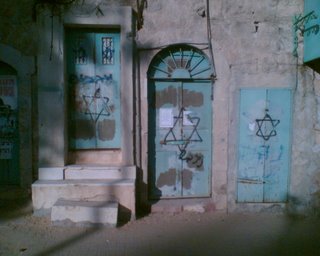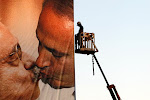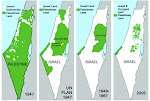 You've likely experienced the inclusive warmth of a nurturing Jewish community, but hardheaded Jews can be masters at nurturing a grudge...even after death. For any lasting conflict resolution, this is the Semitic tribal instinct that peacekeepers must tackle.
You've likely experienced the inclusive warmth of a nurturing Jewish community, but hardheaded Jews can be masters at nurturing a grudge...even after death. For any lasting conflict resolution, this is the Semitic tribal instinct that peacekeepers must tackle.
(photocredit: Jews in Green.com)
KABUL-When Yitzhak Levin died 18 months ago, the tragic-comic feud between Afghanistan’s two remaining Jews should have died with him. But Zablon Simintov, the last Jew left in Kabul, is an unforgiving man. He is penniless and alone, and his synagogue is without its sacred scroll. He blames it all on his arch rival Levin.
“The Taliban didn’t even know what Jews were before that idiot went and told them,” the stocky 47-year-old says. “He was crazy ... but he’s dead. Let’s not talk about him.” For years, the two men lived at opposite ends of Kabul’s Flower Street synagogue complex, a miserable two-story building erected in 1966 when the once-flourishing Jewish community had been reduced already to Levin, Simintov and their mutual hatred. Each was imprisoned and tortured by the Taliban on several occasions and each accused the other of betrayal. Simintov said Levin denounced him as an Israeli spy; Levin, countered in kind. The two men prayed daily, but separately. The exact source of their acrimony is unknown, but certainly Simintov was opposed to the octogenarian’s work as a fortuneteller. He considered it to be “un-Jewish.” Levin was also insulted when his younger rival suggested he move to a warmer climate. But Simintov scoffs at that hurt. Kabul’s winters were bad for Levin’s health, he says.
Their constant bickering was so bad it sometimes even descended to physical fights that kept neighbours awake at night. While the two custodians fought, their small two-story synagogue sat virtually unused, its walls blistered and cracking, old Jewish prayer books stuffed roughly in drawers. When, on a cold morning in 2004, Levin was discovered dead in his dusty room, Simintov was fleetingly suspected of murde r. He was quickly cleared when a post-mortem found Levin had died of natural causes. His was an important passing, however. It left Simintov, a once-wealthy carpet seller who had suffered a Dickensian fall from grace, as Afghanistan’s last remaining Jew. He is penniless, alone and trying to pick up the pieces of a life ruined by the feud. “I remember when he had many cars. He used to come home with bundles of money,” says Ahmed Nasir, 18, a locksmith whose family operates a Flower Street stall at the foot of Simintov’s residence. “He doesn’t have anything now because of Yitzhak’s bad behaviour.” In a way, Simintov’s personal history mirrors that of his people, whose 800-year history in Afghanistan seems destined to end with him.
r. He was quickly cleared when a post-mortem found Levin had died of natural causes. His was an important passing, however. It left Simintov, a once-wealthy carpet seller who had suffered a Dickensian fall from grace, as Afghanistan’s last remaining Jew. He is penniless, alone and trying to pick up the pieces of a life ruined by the feud. “I remember when he had many cars. He used to come home with bundles of money,” says Ahmed Nasir, 18, a locksmith whose family operates a Flower Street stall at the foot of Simintov’s residence. “He doesn’t have anything now because of Yitzhak’s bad behaviour.” In a way, Simintov’s personal history mirrors that of his people, whose 800-year history in Afghanistan seems destined to end with him.
At the turn of the 19th Century the community was at its height. The population swelled to 40,000 as Persian Jews seeking refuge from the forced conversions in neighbouring Iran flooded over the border to settle in Afghanistan.
It was only the creation of Israel in 1948, that convinced them to move again. When the exodus was over, the Jewish population numbered just 5,000. And it shrunk again with the Soviet invasion in 1979, when thousands fled the ensuing violence and repression. Indeed, Simintov even left the country for a six-year hiatus in Israel and Turkmenistan where he met and married his wife Elena. She now lives in Holon, Israel, with the couple’s two daughters. But despite the blood ties and his sorry situation in Kabul, Simintov has no plans to return to Israel.
He cryptically insists: “I don’t have anything to go back to.” “I have problems,” he says. One of those problems, it seems, is the issue of the synagogue’s Torah, its sacred scroll, which was confiscated by a Taliban official years ago and still has not been returned. Simintov is convinced it was seized only after Levin told officials he planned on taking the scroll to Israel. “He told them it was 400 years old and it cost 10 million,” he says. “He was lying. He was old. He lost his mind. That’s why he did stupid things.”
Simintov believes the scroll now resides somewhere in the official’s home province of Kandahar, where about 2,500 Canadian troops are stationed, and he has begun the long and perhaps futile process of trying to re-acquire the book. “They should cut his hand off,” he says of the official who confiscated the Torah. It is the Taliban punishment for theft and apt in this case, he thinks. In the meantime, Simintov spends most of his days and nights alone. He continues to have an easy relationship with neighbours such as Nasir and he says many others in the Islamic Republic have accepted the Jewish presence in their midst without hesitation. “We are simple people, no one says anything to each other,” Nasir says. “We are free with him.” The Jewish legacy in Kabul’s crowded streets tells another story, however. Simintov looks after the last remaining section of the city’s Jewish cemetery.
It is on a hillside in the city’s south end and he has to pay a family of four brothers to occupy the land for him. They, alone, stand guard against its disappearance. The brothers have erected a tall wall around the plot of land, in hopes of fending off gradual encroachment by the Muslim residents of the neighbourhood who already have taken over most of the original burial ground.
It sometimes seems a futile measure, since more than a decade ago most of the tombstones were bulldozed when the Afghan government tried to clear the land of housing, but Simintov either thinks it is sufficient, or doesn’t want to ruffle feathers. “I don’t’ know, they might have done it by mistake,” he says when asked about the bulldozers.
Meanwhile, it is unclear when — or if — Simintov will ever leave Afghanistan. Aside from the missing Torah, there is the issue of ownership of the Flower Street synagogue to consider. He takes that very seriously. As he proudly proclaims: “At least I didn’t remove the Jewish flag from this place. I’m the only one who is still here.” (source: Steven William, What's On in Kabul)
 Snowflakes were drifting down all over Jerusalem, while the Egyptian foreign minister asserted at his joint press conference this afternoon with Israel's Tzipi Livni that this was no snow job. Aboul Gheit announced to gathered reporters that the kidnapped Israeli soldier, Corporal Gilat Shalit, is alive after six months in captivity. What's more, Egypt is actively working for his release.
Snowflakes were drifting down all over Jerusalem, while the Egyptian foreign minister asserted at his joint press conference this afternoon with Israel's Tzipi Livni that this was no snow job. Aboul Gheit announced to gathered reporters that the kidnapped Israeli soldier, Corporal Gilat Shalit, is alive after six months in captivity. What's more, Egypt is actively working for his release.






 r. He was quickly cleared when a post-mortem found Levin had died of natural causes. His was an important passing, however. It left Simintov, a once-wealthy carpet seller who had suffered a Dickensian fall from grace, as Afghanistan’s last remaining Jew. He is penniless, alone and trying to pick up the pieces of a life ruined by the feud. “I remember when he had many cars. He used to come home with bundles of money,” says Ahmed Nasir, 18, a locksmith whose family operates a Flower Street stall at the foot of Simintov’s residence. “He doesn’t have anything now because of Yitzhak’s bad behaviour.” In a way, Simintov’s personal history mirrors that of his people, whose 800-year history in Afghanistan seems destined to end with him.
r. He was quickly cleared when a post-mortem found Levin had died of natural causes. His was an important passing, however. It left Simintov, a once-wealthy carpet seller who had suffered a Dickensian fall from grace, as Afghanistan’s last remaining Jew. He is penniless, alone and trying to pick up the pieces of a life ruined by the feud. “I remember when he had many cars. He used to come home with bundles of money,” says Ahmed Nasir, 18, a locksmith whose family operates a Flower Street stall at the foot of Simintov’s residence. “He doesn’t have anything now because of Yitzhak’s bad behaviour.” In a way, Simintov’s personal history mirrors that of his people, whose 800-year history in Afghanistan seems destined to end with him.






























